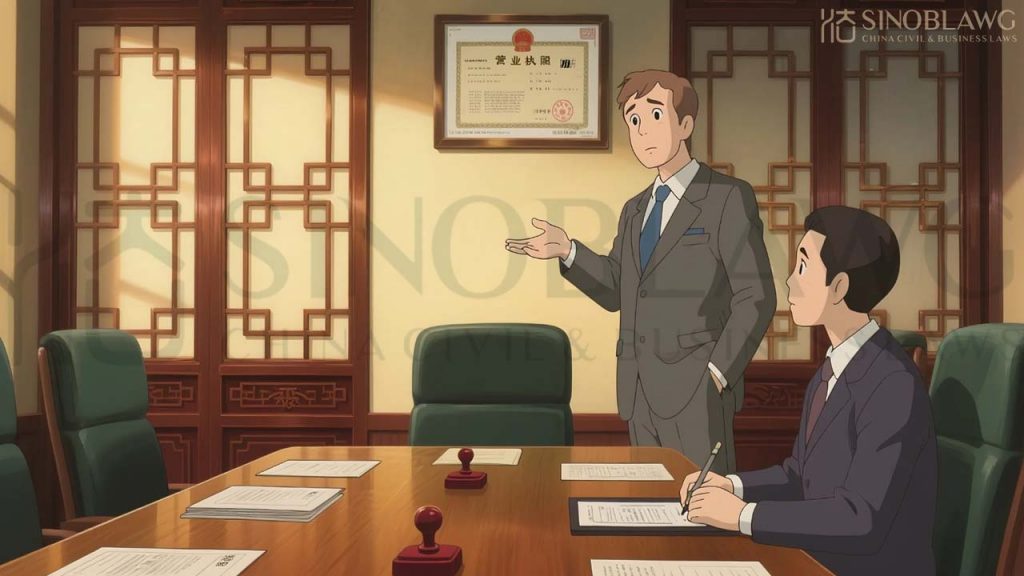This is a true case that I am handling.
FACTS:
A European investor set up a wholly foreign-owned trading company in Shanghai, China as its foothold in China to sell its advanced products. The shareholder appointed three members on the board of directors who are all foreigners with no regular residence in China. One of the director was appointed to serve as the general manager of the WFOE company and concurrently as the legal representative of the WFOE. The WFOE was poorly run by the general manager and legal representative and had been losing money for all the past a few years. At a point, the European investor was not willing to inject more fund into the WFOE and started suspecting the misconducts by the general manager. Because of shortage of operating fund, the WFOE failed to pay office rentals, leading to closure of its office by landlord who exercised lien over some of the corporate properties including the very important Business License (an equivalent of Incorporation Certificate in other countries) for the WFOE. In the meantime, the general manager resigned after not receiving his salaries for months but he kept the general chop of the WFOE and other chops, refusing to turn over the chops to the shareholder before being paid of his salaries.
In order to keep this Shanghai WFOE from collapsing, the shareholder wants to replace the current legal representative. Under Chinese laws, in order to effect the change of legal representative, the company registration authority needs take back the old Business License which is kept by the landlord. After being paid the rental in arrears, the landlord said that he shall return the documents and materials only to the legal representative of the Shanghai WFOE or someone authorized by the legal representative because the legal rep is supposed to represent the company, which definitely has a solid point there.
Now there is a standoff in the WFOE company.
WHAT IS WRONG
The standoff arises because the legal representative of the WFOE company has too much control over the operation of the company, easily breeding the insider control situation. From the accounts of my client, the shareholder has placed too much trust in the legal representative and leaves everything about the WFOE to the legal rep. In the meantime, the supposedly supervision mechanism fails to function. When things go wrong, the shareholder is almost kept in darkness with no access to the financial conditions of the company and with no way to find out how much debts the company has incurred.
While I am speaking against such arrangement of leaving all control to one person, I understand that from the investor’s point of view, this is the practical arrangement. At the time of setup of the WFOE company, the shareholder has nobody else that is more trustworthy than the general manager and legal representative, and the other two directors on the board and the one supervisor are all foreigners who do not work or live in China, effectively putting the fate of the company in the hand of the general manager and legal representative.
When the company’s Business License and general chop are both controlled by the legal representative who turns against the company, it is always a disaster to shareholders. Usually in such a hijack event, shareholders almost can do nothing to solve the problem unless resorting to court proceeding which may take such a long time that can well drag the company into collapsing.
LEGAL ADVICE
This is not an isolated case in Chinese corporate world. A slew of cases can tell you how important to put balance and check in the corporate governance systems.
1. There should be detailed rules in the articles of association of the company dealing with legal representative hijacking the company by providing penalties on such misconduct.
Though China Company Law provides for fiduciary duty of legal representative for the company, there is no clear legal liability imposed on breach of such duty.
2. If practical, avoid leaving all business license and chops with the legal representative. Companies should establish rules for the the keeping and use of corporate chops and business license, in particular, the general chop of the company.
3. Specifically, try to put the general corporate chop in the a person’s hand other than the legal representative, for example in the hand of a director.
4. In order to keep a close eye on the financial conditions of the company, shareholder shall make sure that the financial person is not appointed by the general manager. China Company Law provides that the chief financial officer shall be engaged by the board of the directors based on the nomination of the general manager. So shareholders shall ensure that the board will independently select a financial chief that is not easily susceptible to the general manager so that he can be an effective check on the general manager.
5. It is important that investors shall keep an active board of supervisor or one or two supervisors who will keep eyes on the management of the company by the managers and officers. Many investors neglect the significance of active supervision mechanism in the company. Of course, who shall serve as your supervisors is a question. I would recommend that investors consider using the lawyers you trust to serve as supervisor.
China’s unique corporate culture in terms of the use of chops and adoption of legal representative system can cause really damaging situation to a company and thus the shareholders. Ironically, there have been no clear laws and rules in regard of these two very important things, which lead to much confusion in practice.
For more about legal representative in China, please click here;
For more about the corporate chop in China, please click here.





Yes indeed that would be rerrible without a court order. But then how can a lawyer find out about the existence of a bank account? Is there a registry for bank account numbers centrally maintained by the PBOC?
well, this is a good question. So far as I know, it is not possible to check out the existence of others’ bank accounts even with the court order. At least, i have not done so before.
There are agencies in the market that claim to be able to find out all of one’s bank accounts. It is an illegal practice but it works.
Hello Jason,
While reading your article I’ve been thinking it is likely the GM and legal rep misappropriated funds from the WFOE. In this case, they might have deposited the ill-gotten gains into some bank account of theirs.
I heard Chinese lawyers can go to the PBOC branch of their town to print the list of the bank accounts individuals and companies alike have in China. Is it true lawyers can do that? Conversely, can I, if I want to inquire about my existing or past bank accounts, go to the PBOC myself and have that information printed (in a rather similar fashion as the printing of a credit report inquiry)? What do you think?
Hi Sam, yes, it is right that the GM and legal rep is very much likely to have misappropriated fund of the company, or have engaged in other activities to channel the corporate fund into his personal pocket.
Lawyers in China don’t have the right to look into the bank accounts of others, either individual or corporate. that sounds terrible, doesn’t it? Generally, lawyers here can obtain a court order in order to find out the bank information of a certain account. The court order is only possible to get after the case is filed with court.
You can always go to the bank to print history information of your account. you don’t have to go to PBOC branch. Some banks will charge you some small fee for printing information beyond half a year.